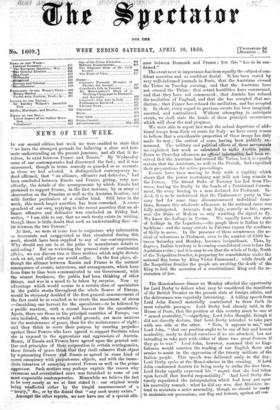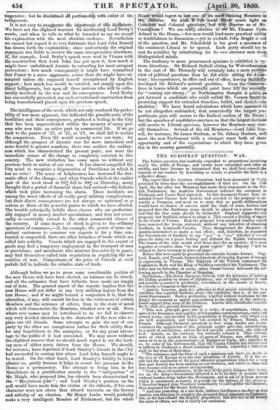The Mansionhouse dinner on Monday afforded the opportunity for Lord
Derby to deliver what may be considered the manifesto of the British Premier on the present state of foreign affairs, and the deliverance was especially interesting. A telling speech from Lord John Russell materially contributed to draw forth its most valuable passages. Lord Derby had already said, in the House of Peers, that the position of this country must be one of " armed neutrality,"—signifying, Lord John thought, though it did not directly declare, that Lord Derby intended to take part with one side or the other. " Now, it appears to me," said Lord John, " that our position ought to be one of fair and honest neutrality, ready to defend ourselves if we are attacked, but not intending to take part with either of those two great Powers if they go to war." Lord John, however, assumed that no Eng- lishman would sanction the sending of our English fleets and armies to assist in the oppression of the twenty millions of the Italian people. This speech was delivered early in the day: Lord Derby spoke at the Mansionhouse in the evening. If Lord John condemned Austria for being ready to strike the first blow, Lord Derby equally expressed his " regret that she had taken upon herself that fearful responsibility." And Lord Derby dis- tinctly repudiated the interpretation which had been put upon his neutrality remark : what he did say was, that Ministers in- tend to maintain a strict neutrality, though we should be ready to maintain our possessions, our flag and honour, against all con-
tingencies ; but he disclaimed all partisanship with either of the belligerents.
It is not easy to exaggerate the inipartance of this die.laimer. We have not the slightest warrant fbr mistrusting LorirVerby's words, and when he tells us what he intended to say we accept his explanation with the most absolute credence. Nevertheless we cannot but regard it as very fortunate that Lord John Russell has drawn forth the explanation ; since undoubtedly the original statement was liable to receive the same interpretation elsewhere. If, for example, Lord Derby's speech were read in Vienna with- the construction that Lord John has put upon it, how much it might have emboldened Austria in extending her most arrogant pretensions ; how much consequently it might have committed that Power to a more aggressive course than she might hive at- tempted.' unless she supposed herself strengthened by English support ; how much loss would be entailed, not simply upon the direct belligerents, but upon all those nations who will be oolla- terally involved in the war and its consequences. Lord Derby has, successfully prevented any such overstrained construction from being henceforward placed upon his previous speech.



























 Previous page
Previous page